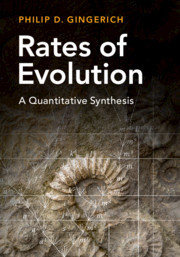Rates of Evolution A Quantitative Synthesis
Langue : Anglais
Auteur : Gingerich Philip D.

An overview of evolutionary rates, analyzing data from laboratory, field and fossil record studies to extract their underlying generation-to-generation rates.
How fast is evolution, and why does it matter? The rate of evolution, and whether it is gradual or punctuated, is a hotly debated topic among biologists and paleontologists. This book compiles and compares examples of evolution from laboratory, field, and fossil record studies, analyzing them to extract their underlying rates. It concludes that while change is slow when averaged over many generations, on a generation-to-generation time scale, evolution is rapid. Chapters cover the history of evolutionary studies, from Lamarck and Darwin in the nineteenth century to the present day. An overview of the statistics of variation, dynamics of random walks, processes of natural selection and random drift, and effects of scale and time averaging are also provided, along with methods for the analysis of evolutionary time series. Containing case studies and worked examples, this book is ideal for advanced students and researchers in paleontology, biology, and anthropology.
1. Introduction; 2. Variation in nature; 3. Evolutionary time; 4. Random walks and Brownian diffusion; 5. Temporal scaling and evolutionary mode; 6. Directional selection, stabilizing selection, and random drift; 7. Phenotypic change in experimental lineages; 8. Phenotypic change documented in field studies; 9. Phenotypic change in the fossil record; 10. A quantitative synthesis; 11. Retrospective on punctuated equilibria; 12. Genetic models; 13. Independent contrasts: Phylogeny's influence on phenotypes; 14. Rate perspective on early bursts of evolution; 15. Summary and conclusions; Appendix: generation times in bacteria, plants, and animals; References; Index.
Philip D. Gingerich is Professor Emeritus of Earth and Environmental Sciences, Ecology and Evolutionary Biology, and Anthropology at the University of Michigan; as well as Curator Emeritus of Vertebrate Paleontology. His honors include the Henry Russel Award, Distinguished Faculty Achievement Award, and Collegiate Professorship at the University of Michigan; Schuchert Award from the Paleontological Society; Dumont Medal from the Belgian Geological Society; and the Romer-Simpson Medal from the Society of Vertebrate Paleontology. He is a fellow of the American Academy of Arts and Sciences and the American Philosophical Society, and was previously President of the Paleontological Society.
Date de parution : 05-2019
Ouvrage de 396 p.
17.8x25.3 cm
Thème de Rates of Evolution :
© 2024 LAVOISIER S.A.S.
